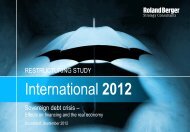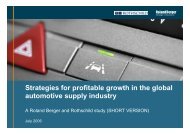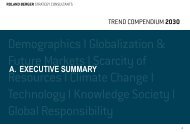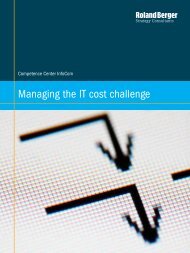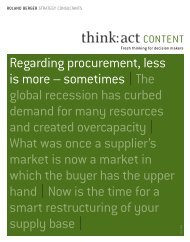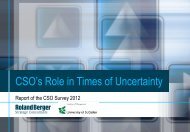issue 1 - Roland Berger
issue 1 - Roland Berger
issue 1 - Roland Berger
You also want an ePaper? Increase the reach of your titles
YUMPU automatically turns print PDFs into web optimized ePapers that Google loves.
“Competencies count”<br />
Companies should concentrate on factors that distinguish<br />
them from the competition, says HP director Wolfram Fischer.<br />
For everything else, there’s offshoring.<br />
THINK: ACT What is offshoring all about? Is it<br />
just a lot of hot air as with the new economy,<br />
or is it really the “third revolution in<br />
added value?”<br />
WOLFRAM FISCHER In our intensely competitive,<br />
service-oriented society, it’s not enough to<br />
offer standard products at an average price.<br />
Especially in the solutions business, every component<br />
needs to be cost-effective while also<br />
high quality. Offshoring presents the opportunity<br />
of obtaining more service for less money.<br />
That’s a necessity for international companies—and<br />
a huge future market for providers.<br />
What experience have you personally<br />
gained in low-wage countries?<br />
HP’s global delivery model relies on resources<br />
across the world. In Bangalore (India), Bratislava<br />
(Slovakia) and Warsaw (Poland) we employ<br />
highly motivated, well-trained people<br />
with excellent language skills. Alongside inexpensive<br />
wage and operating costs, they constitute<br />
optimal production factors. Offshoring<br />
also offers advantages as regards flexibility,<br />
process speed and customer orientation. Only<br />
by using these do we create added value according<br />
to the principle of “high-tech, low cost.”<br />
Which branches of industry are particularly<br />
benefiting from offshoring?<br />
In the manufacturing industry the whole <strong>issue</strong><br />
has been done and dusted. Nowadays the textile<br />
industry produces almost exclusively in China,<br />
Vietnam, Thailand and Malaysia. With<br />
computers, it’s similar. More than two thirds of<br />
all notebooks come out of Taiwan. Financial<br />
service providers are going to initiate the next<br />
wave. They keep outsourcing more and more<br />
business processes that until recently were still<br />
considered core competencies—not only IT, but<br />
also everything from administration to personnel<br />
management.<br />
Is there anything that shouldn’t<br />
be outsourced?<br />
You should not outsource the core competencies<br />
that make you stand out from the competition,<br />
since there are fewer and fewer of these. Core<br />
elements include all processes that directly add<br />
value, especially product development and customer<br />
interfaces. A company can stand out in<br />
these areas and avoid being seen as a “me too”<br />
player. However, outsourcing is a strong option<br />
in all areas where processes can be defined and<br />
standardized. Already there are companies<br />
that have outsourced all operating activities,<br />
restricting themselves to brand management.<br />
Nike, which has its products manufactured<br />
by 900 partner companies worldwide, springs<br />
to mind.<br />
Are you not understating the hurdles?<br />
Obviously, it’s necessary to have a practice<br />
phase, the length of which is often underestimated.<br />
But any problems are going to be absolutely<br />
manageable and no different from the<br />
<strong>issue</strong>s presented by any new project.<br />
Is offshoring to India not failing on account<br />
of cultural differences?<br />
Not at all. In just a few years, thanks to exceptionally<br />
well-trained IT specialists, the country<br />
has been able to manufacture first-class software<br />
components with significantly lower<br />
costs. Obviously, one has to manage cultural<br />
differences as well, but that hardly presents<br />
WOLFRAM FISCHER is managing director of<br />
Hewlett Packard GmbH. As vice president of the<br />
Technology Solutions Group Germany, one of his<br />
responsibilities is outsourcing. His experience as a<br />
sales manager in the Asia-Pacific region made him<br />
one of the best experts on its IT service market.<br />
Fischer has a bachelor’s degree in business administration<br />
and computer science.<br />
any problems these days, since the Asian<br />
region is increasingly opening up to the<br />
Western world. Even at our locations in China,<br />
most of the workers are locals whose integration<br />
into the company is considered business as<br />
usual. Offshoring gets difficult when physical<br />
and logistical problems are added in. But that’s<br />
no longer an <strong>issue</strong> with digital products.<br />
Is quality still optimum?<br />
With consumer goods today, price plays a larger<br />
role than top quality. Does a 20 euro running<br />
shoe really need to last me 10 years, or<br />
should I just buy a new pair every year? There<br />
are even countless IT services that have been<br />
standardized for a long time now.<br />
Is outsourcing solely a question of economic<br />
necessity? According to one study, managers<br />
who outsource processes and slash jobs are<br />
making very good money.<br />
It’s wrong to think there’s a direct causal relationship<br />
there. Outsourcing results in cost and<br />
price advantages of up to 40 percent, leading to<br />
improved earnings. Obviously, managers who<br />
are compensated on a success-dependent basis<br />
benefit from that. So what’s wrong with managers<br />
trying to find the most cost-effective solution?<br />
That’s their job, after all.<br />
think: act 47



